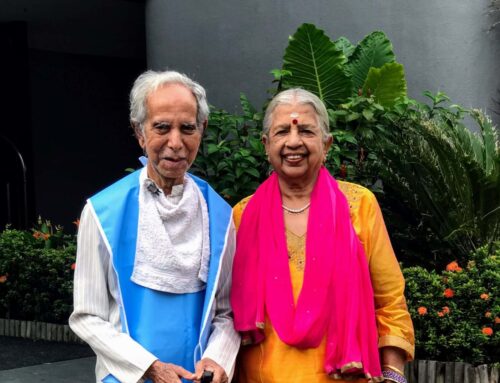A week ago, my 80-year old father joined Facebook. He quickly acquired three friends: my brother, me and my mum (who had joined Facebook the week before).
Here is my issue: I am not sure I want to be “friends” with my parents. They live around the corner from me and I see them almost every day. They drop in to check out what’s happening in my household and I do the same with them. They know when my bathroom tap leaks, when the dishwasher serviceman shows up on time and when I am planning a party.
I thought Facebook was a sanctum from my extended family and for years it was. In the last month though, I find that septuagenarian aunts and uncles who have suddenly discovered Facebook and want to “friend” me.
True to form, I dither and ignore their friend requests. Many of them phone me the minute after they have sent a request to ask if I have seen it. I say I haven’t. They keep on calling.
Oh, and here’s the other thing. They have discovered the joys of texting as well. My 86-year-old aunt, whose fingers have swollen because of chronic arthritis, now texts me as if she were a teenager. “R u online LOLZ?” she asks.
“Wassup?” she asks.
“Nothing much,” I reply in chaste English, rebelling like a teenager against her SMS-speak.
“How are you?” I ask.
She replies with a single letter: “K”.
The whole point of being cool is to make your elders feel traditional and old-fashioned, to be different from the nonagenarians. For the most part, the elders in my family are indeed conventional, even conservative. They play to part.
Except with texts. Then they act like ditsy teenagers. Why do they love this SMS-speak? I wonder. Is it because they cannot type, which many in my family cannot? Or is it because they have been taught social media protocol by their grandchildren?
On Facebook, if not in texts, the elders in my family act their age. Their true personas come out. But this too, is not without its issues.
My mum, for instance, is very spiritual, which is a blessing in real life. She calms me down and soothes my angst with her touch and words.
Her spirituality however, takes centre stage on Facebook. She posts messages about meditating during the full moon to absorb its beneficial healing rays. She announces the date for Hindu festivals and suggests rituals to follow.
All of this would be fine were it not for my friends who have helpfully found my mother through Facebook’s unhelpful friend-finder and befriended her. “Boy, your mum is really religious,” they say. “Unfriend her,” I reply.
Is Facebook a platform or a way to keep in touch? My mum treats it as a soapbox. She has a number of students who seek her for meditation lessons, so she views Facebook as a tool to give the same instructions to everyone, kind of like a group SMS.
But I don’t want my weird atheist friends to connect with my mum. It is like two universes colliding.
My folks love it though. My mum called me early one morning. “I have 20 notifications from Facebook,” she said excitedly. “What should I do?”
So I went through a long and painful process of instructing her how to improve her email notification settings, only to have the power fail at the last minute before she could save the new settings. “Come over and do it for me,” said mum. For good measure, she sent me a Facebook poke, which I ignored, I might add. Where is the “sulk” icon when you need it?
My teenage daughter is very comfortable with Facebook. Like many of her age and generation, she communicates with friends predominantly through social media. They post photographs, daily updates and tease each other. In the “sandwich generation”, I have my mum on one side and my daughter on the other, both more active on Facebook than I am.
So recently, I did my daughter a favour: I unfriended her.
Shoba Narayan is the author of Return to India: a memoir
Online: shobanarayan.com



Leave A Comment